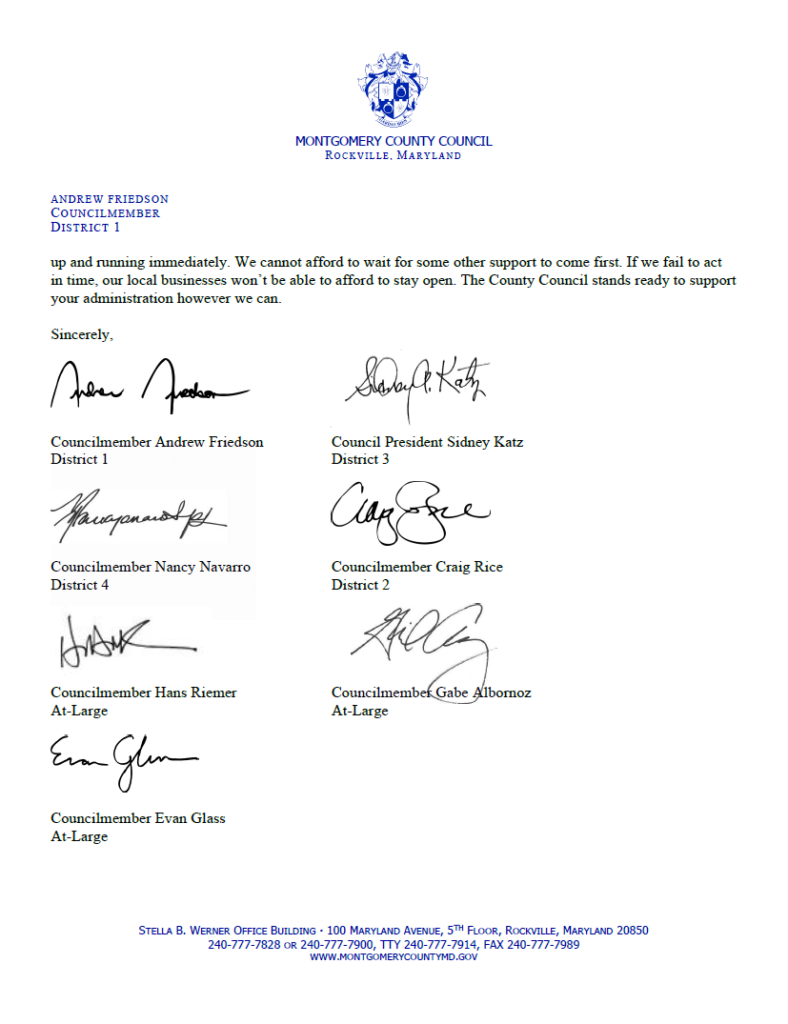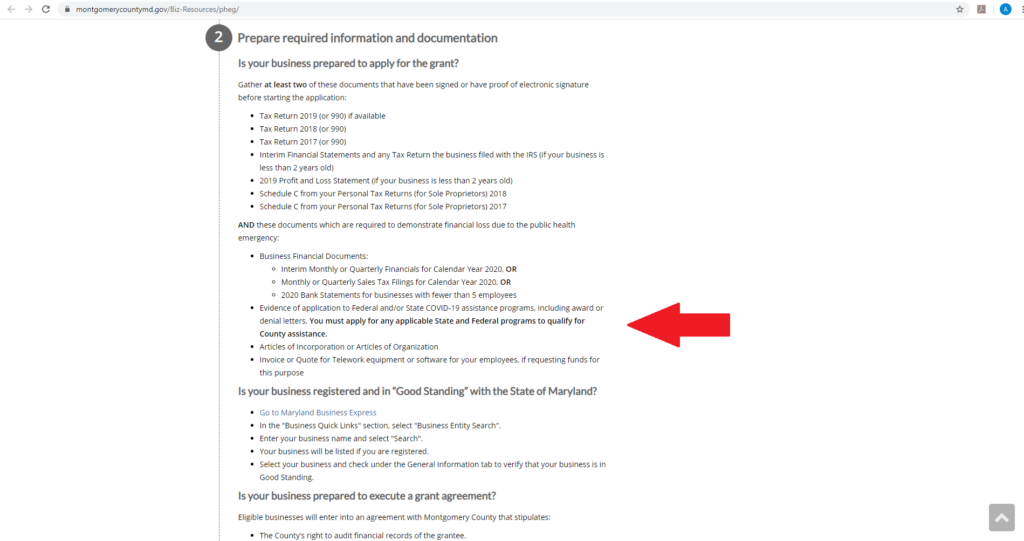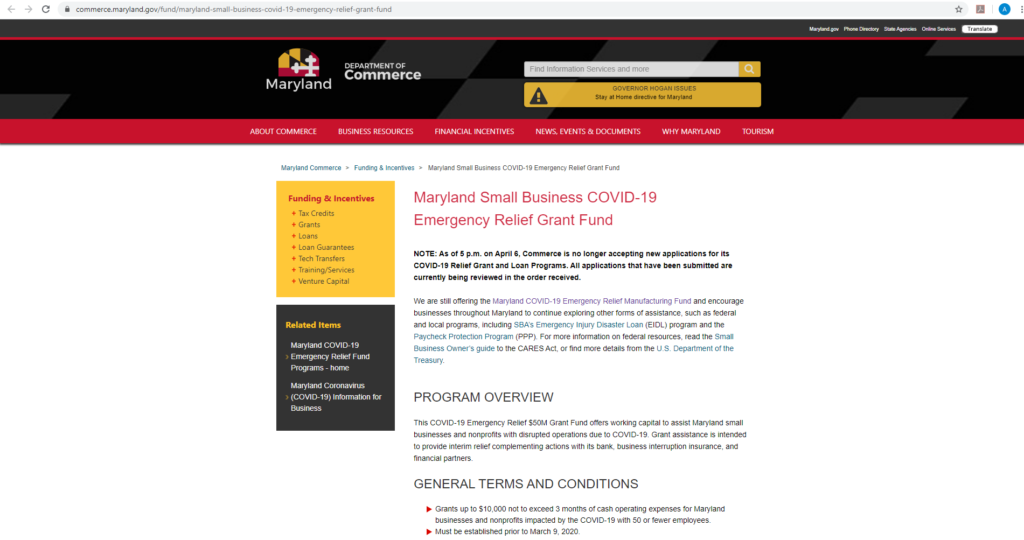By Adam Pagnucco.
The county has announced via press release that COVID-19 assistance for small businesses will be open for application tomorrow (April 15). But questions arise both from the release and what is not in the release.
1. The application process is supposed to open in the “mid-afternoon.” No exact time is given in the press release. Will business owners be refreshing their browsers for hours waiting for the application to go live?
2. According to the press release, “The County will host webinars to answer questions and provide updates on the PHEG program starting at 9 a.m. Mondays through Saturdays. The first webinar will be held on Thursday, April 16.” In other words, the first Q&A webinar will not take place until THE DAY AFTER applications open.
3. As of this writing, multiple sources in the council building report that the council does not have final regulations governing the disbursement of the money. How is the administration going to make decisions on who gets the money? Why have these criteria, in the form of a regulation or otherwise, not been publicly released – or at least sent to the council – prior to the start of applications?
4. The legislation passed by the council authorized grants of up to $75,000. At the time of passage, council members stressed their interest in rapid disbursement. Today, a phone call was held by representatives of the executive branch with representatives of the business community in which some details were shared about the administration’s plans. According to an individual present on the call, “We heard that the 1st wave was the first 1,000 qualified recipients would receive $10,000 as a start. They may receive more later TBD.” Furthermore, only losses in March will be considered and priority will go to businesses with losses of more than $50,000. An earlier requirement that applicants apply for federal and state assistance first has been dropped. So it appears that $10 million will be disbursed first and that $10 million will wait for later – at least as of this writing. If there is indeed a hold on part of the money, why is that? What will happen to it and when will it get released?
This would be a lot easier to figure out if the administration simply released its regulations on how they are making these decisions, or even a simple guidance document. Instead, in the absence of published documentation, rumor rules the day.
Let’s be clear: the executive branch is in a tough spot here. They had to stand up a $20 million assistance program on short notice (although D.C. did the same in half the time). If they disburse small checks to lots of businesses, the money may not be enough to help any of them. If they disburse large checks that might be helpful, MANY businesses will be left out. So there are choices to make.
The problems are that the executive branch is diverging widely from the intent for speed of the legislation passed by the council, is forcing applicants to sit next to a browser and refresh it potentially for hours, is not offering aid for completing the application until the day after it goes live and has not published details of how it intends to spend $20 million.
This process is in need of improvement.
The press release is reprinted below.
For Immediate Release: Tuesday, April 14, 2020
Montgomery County Public Health Emergency Grant (PHEG) Program Applications Will Be Accepted Starting Mid-Afternoon on Wednesday, April 15
Montgomery County will begin accepting applications to its Public Health Emergency Grant (PHEG) program beginning mid-afternoon on Wednesday, April 15. The PHEG initiative is designed to help for profit and nonprofit businesses with 100 employees or fewer during the current public health crisis.
A sample of the application is now available in English and Spanish on the PHEG program web page. The website provides information for businesses on how to prepare their grant applications. The sample applications will guide businesses in pulling together the information and documents required to file their applications.
A fact sheet describing eligibility and document requirements also will be available in Spanish, Amharic, French, Korean, Mandarin and Vietnamese.
The $20 million PHEG initiative is a collaborative effort between County Executive Marc Elrich and the Montgomery County Council. In addition to for-profit and nonprofit businesses, the program is open to businesses with no employees including sole proprietors and independent contractors.
Montgomery County’s PHEG program is intended to provide financial assistance to establishments that have experienced a significant reduction in revenue as a result of the current public health emergency. The County is encouraging businesses and nonprofit organizations to review other assistance programs and apply to those for which they are eligible.
The County will host webinars to answer questions and provide updates on the PHEG program starting at 9 a.m. Mondays through Saturdays. The first webinar will be held on Thursday, April 16. For links and instructions, visit www.montgomerycountymd.gov/biz-resources/pheg.
More information on the PHEG program is available at www.montgomerycountymd.gov/Biz Resources/pheg/. Questions about the program should be directed to BizinfoCovid19@montgomerycountymd.gov.
For the latest updates, visit the County’s COVID-19 website and follow Montgomery County on Facebook @MontgomeryCountyInfo and Twitter @MontgomeryCoMD.





